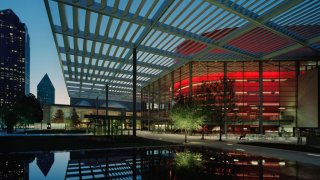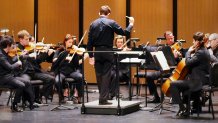
Cancel, postpone and pivot: those are the key strategies Dallas arts organizations are using to survive the coronavirus pandemic. Despite their best efforts, a new survey of the city's arts organizations reveals the nonprofit Dallas arts and cultural community suffered $33.65M in financial losses in the first 2 and a half months of COVID-19 related closures, including layoffs or furloughs of 649 artists and staff.
The Arts Community Alliance (TACA), Dallas Arts District (DAD) and Dallas Area Cultural Advocacy Coalition (DACAC) conducted the survey of 57 Dallas-based nonprofit arts and cultural organizations. Survey questions covered the period from March 13 through May 31, 2020.

According to responses, the forced closures caused performing arts organizations to cancel or defer 804 performances; visual arts organizations to close, collectively, for 747 attendance days; all groups together to cancel or reschedule 2,609 workshops, classes and programs. Collectively, the groups projected their lost or deferred attendance numbers of 1.3 million for the 2 and a half month period.
“These survey findings reflect the significant damage the COVID-19 pandemic has had on the arts community in Dallas,” Terry D. Loftis, Carlson President and Executive Director of TACA, said. “When we fielded the survey, we anticipated the results would bring that impact to light, but these finds are truly staggering. The Dallas creative community has been impacted in ways we might never have anticipated, and without private and civic investment, we’ll be challenged to reverse the damage caused by the pandemic, affecting our community as a whole, artists, arts organizations, and audiences for the long term.”
Many groups were able to retain staff due to CARES Act funding through the Small Business Administration loans. Forty cultural groups received PPP loans, many of which are forgivable. To achieve forgiveness of these loans, recipients were required to keep a number of staff employed at certain pay levels for a period of time, usually eight weeks. Most of those loans begin expiring this month. This is already causing some groups to implement new furloughs or layoffs. Some are implementing salary reductions for the staff that remain.
Adding to the industry's concerns are severe projected budget cuts to the City of Dallas Office of Arts and Culture as officials grapple with millions of dollars in lost revenue due to the impact of COVID-19 on the economy. “The arts generate revenue, so these closures have ripple effects across the city’s economy,” Lily Weiss, executive director of the Dallas Arts District, said. “We not only lose the direct spending of these groups and that of the employees laid off but also the revenue tied to restaurants, lodging, tourism, retail, transportation and more, all of that is gone.”

The nonprofit arts and culture sector in Dallas alone was generating an annual economic impact of $891M supporting 13,000 jobs, according to a 2015 study from the Americans for the Arts. The sector drives tourism, boosts property values and helps attract corporate relocations and talent. That economic impact also generates $45M in local tax revenue.
Local
The latest news from around North Texas.
Since the survey was conducted, Texas Governor Greg Abbott issued guidelines for reopening for both museums and fine arts performance venues at reduced capacity levels. The survey showed 67% of non-performance based respondents have set a date for reopening while 44% of performance-based respondents know when they will reopen.
As the number of new coronavirus infections reported daily rises, the Perot Museum of Nature and Science and the Dallas Holocaust and Human Rights Museum decided to postpone their planned July reopenings. The museums are now coordinating with Dallas Museum of Art, Nasher Sculpture Center, Crow Museum of Asian Art, and The Sixth Floor Museum at Dealey Plaza to evaluate reopening plans.
The survey revealed most performing arts organizations do not plan to reopen until late summer and fall, while some may delay until 2021. TITAS/DANCE UNBOUND will open its season in October, rather than August. The Dallas Opera will not begin its next season until March 2021.

As North Texas COVID-19 hospitalization numbers rise, fears of more restrictions and closures add uncertainty for reopening plans. “The arts sector is made up of small businesses and an important part of our city’s economy,” Joanna St. Angelo, president of the DACAC, said. “We felt nobody had a handle on what was happening to our arts community. This study gave us a pulse rate, and right now the prognosis isn’t good.”



